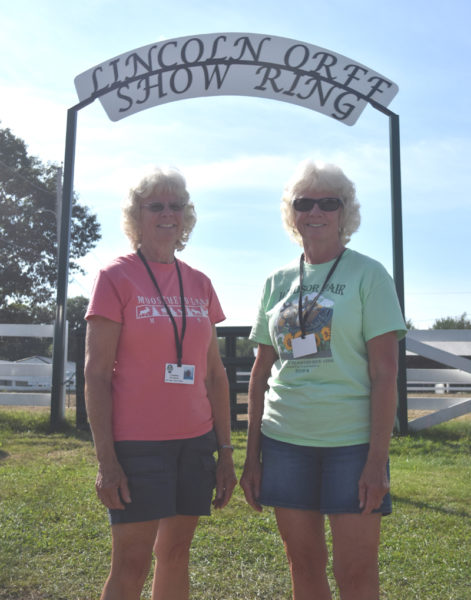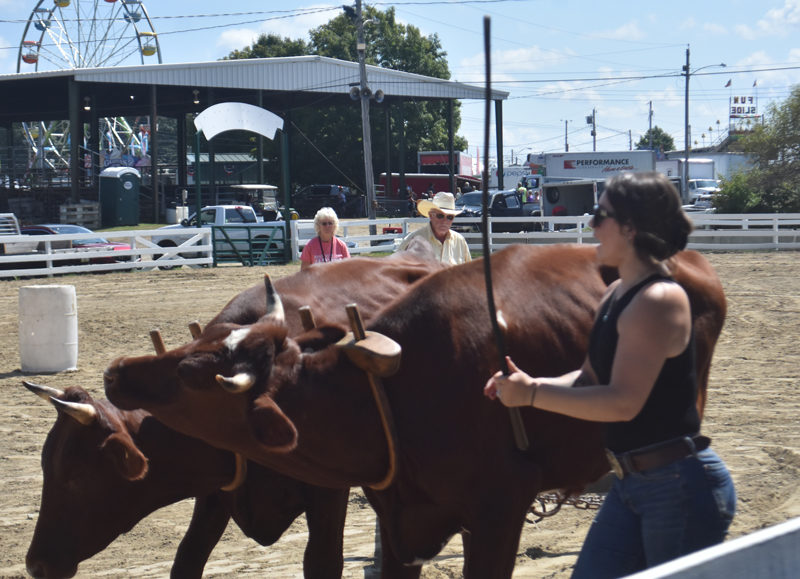
Claudene Northrup (left) and Claudia Orff-Reed, sisters from Jefferson, stand at the Lincoln Orff Show Ring, which is named for their father, who passed away in 2021. Orff was secretary at the Windsor Fair for more than 30 years and well known for the show steers he raised, trained, and showed with Orff-Reed and Northrup. (Molly Rains photo)
With two familiar Jefferson faces at the helm, the New England tradition of showing steer and oxen at the fair is going strong in Windsor.
For the run of the Windsor Fair, sisters Claudia Orff-Reed and Claudene Northrup can be found overseeing the fair’s show steers and oxen department. As the twins judge events and assist attendees, they are carrying on a family tradition, embodying the same deep care and enthusiasm for livestock showing for which their late father and longtime Windsor Fair trustee Lincoln Orff is remembered in the community.
“I know that my father always enjoyed it, and I do, too,” said Orff-Reed, who took over the position of superintendent of show steers and oxen after Lincoln Orff passed away in 2021. Concurrently, Northrup stepped up to become assistant superintendent, a role previously held by Orff-Reed, keeping the Windsor Fair show steers and oxen department fully in the family.
As department heads, Orff-Reed and Northrup oversee a range of events: scooting, in which a teamster guides two steers or oxen through an obstacle course; twitching, or log pulling; and the steer and oxen show at the end of the week.
Steer and oxen are male cattle that have been castrated, making them more docile and well-suited to be employed as working livestock. The animals are referred to as steer when they are less than four years old and oxen when they are four years and older.
Each year, the Windsor Fair draws hundreds of cattle to the Lincoln Orff Memorial Show Ring. The events are popular: Lincoln Orff had to limit scooting to Maine teams, Orff-Reed recalled, after opening the competition up to teams from other states for just one year resulted in unmanageable numbers of competitors.
This year, 67 teams of steers and oxen, along with their human escorts, came to the Windsor Fair for the week. To compete in the week’s events before the final show, Northrup said, competitors are encouraged to stay at the fair for the week. Many choose to camp out onsite.
Northrup credited this idea to her father.
“He wanted to encourage people to stay for the week, and he wanted them to stay busy,” Orff-Reed said.
Orff-Reed and Northrup recognize that, because of how involved the competition is, participation requires a big commitment.
“It’s quite a dedication for people. They take their vacations and come to these events,” Orff-Reed said.
Preparing teams for showing is an even bigger commitment, requiring “hours and hours” of work year-round, Northrup said.
The sisters would know: for decades, they showed steer with their father. Training the animals to communicate and work together is a major task, said Orff-Reed,
However, growing up on a farm, the sisters were no strangers to hard work. As children, they helped gather eggs from beneath laying hens, cleaned, and hayed.
“We knew what work was,” Northrup said.
When the family got their first steers in 1969, helping train the animals became another task with which Orff-Reed and Northrup helped their father. The family got their first pony the same year, and the sisters learned to ride. Later, in addition to showing steers, the two competed in barrel racing.
Both the events of scooting and twitching hearken back to the days when steer and oxen were widely used for tasks like plowing, towing, and logging. Nowadays, Orff-Reed and Northrup said, these events function less as demonstrations of practical skills and more as a way to preserve tradition.
“This used to be a way of life, but it’s disappearing,” Orff-Reed said.
For many competitors, the fair also serves a social purpose. Old and new friends caught up in the bleachers, while members of multiple generations competed in the ring below.
Northrup referred to the community that comes together during fair season a “family.”
Staying involved, she said, “is a way for us to stay connected.”
Even within traditional families, the fair can unite generations.
Lauren Robinson, of Litchfield, who competed in the scooting event with two teams of steers, said she had been working with the animals since she was 5 years old. Robinson’s mother and grandfather also competed on the same day.
“It’s a family tradition,” Robinson said of her desire to stay involved in the event. “It’s been handed down.”
For Orff-Reed and Northrup, the fair was something they shared with their father for more than 50 years. Now, the fair still brings up many memories.
Lincoln Orff began his fair involvement by showing a pair of steer, Orff-Reed said. Then, he was recruited to help announce at events. Orff served as secretary for the fair for more than three decades and sat on the board of trustees.
Orff loved showing steer and was passionate about other fair events, too, the sisters said.
Northrup recalled one time that Orff, along with her own husband and her daughter’s husband, pooled their money to place a bet on Northrup’s daughter Christy Roy, who was competing in a barrel race competition.
“She was the last one to go,” Northrup recalled, upping the ante; ultimately, Roy emerged victorious. The family, including Orff, was elated.
“It was the most exciting time,” Northrup recalled.
Orff’s dedication to the fair continued unabated until his death in 2021 at the age of 90.
The show ring where steers and oxen compete at the Windsor Fair is now named in his honor, and Orff-Reed and Northrup continue to bring their family’s passion for livestock showing and handling to that ring every year, doing their part to keep the tradition vibrant for generations to come.
The 2024 Windsor Fair opens Saturday, Aug. 24 and continues through Monday Sept. 2. For more information, go to windsorfair.com.

Lauren Robinson (right), of Litchfield, guides her steer to the finish line on the scooting course at the Windsor Fair on Tuesday, Aug. 27, while judges Claudene Northrup and Steve Norton look on from the background. Robinson, who achieved a near-perfect score, said that she had been training animals since the age of 5 and was the third generation of her family to do so. “It’s been handed down,” she said. (Molly Rains photo)



